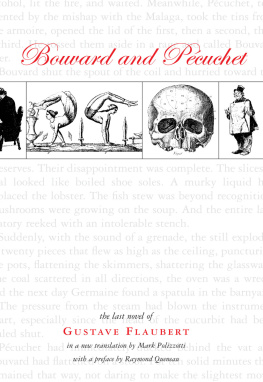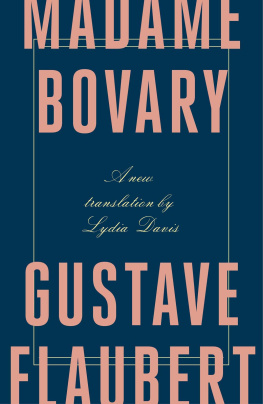Originally published in French as Bouvard et Pcuchet , Dictionnaire des Ides Reues, and Catalogue des Ides Chic.
Partially funded by grants from the Lannan Foundation and the Illinois Arts Council, a state agency.
Dalkey Archive Press is a nonprofit organization located at Milner Library (Illinois State University) and distributed in the UK by Turnaround Publishers Services Ltd. (London).
Stan and Ollie in the Lab
I N THE SUMMER OF 1872, the fifty-year-old Flaubert wrote to the literary salonist Edma Roger des Genettes, Im contemplating something in which Ill vent all my anger. Yes, at last I shall rid myself of what is stifling me. I shall vomit back onto my contemporaries the disgust they inspire in me, even if it means ripping my chest open.
Originally titled The Story of Two Nobodies, this was to be an encyclopedic panorama of human stupidity, the project for which had occupied him for decades, and which finally reached near-fruition as his last, unfinished novel. Contemplation not being the same as execution, it was a full two years after the letter to Mme. des Genettes that he announced to his Russian colleague Turgenev, On Saturday, August 1, I shall at last begin Bouvard and Pcuchet ! There will be no turning back. But such terror! It is as though I were embarking on an immensely long voyage, toward unknown regions, and that I shall never return. He never did, for six years later Flaubert was abruptly carried off by a cerebral hemorrhage, and his long voyage was still incomplete.
It was not from lack of trying. Despite his relatively modest bibliography (especially when compared with his contemporaries Balzac, Hugo, and Zola), Flaubert was a highly dedicated and hard-working writer. Each of his novels required vast amounts of research, whether in the field or on the printed page: for Bouvard and Pcuchet , he famously read some fifteen hundred volumes, much like the protagonists themselvesand not without their litany of complaints. Im going to have to study a host of things I know nothing about, he told Mme. des Genettes. One would have to be insane, completely deranged, to take on such a book! The enterprise appears even more insane when we consider that a huge portion of his research ended up on the cutting room floor, and that entire months of perusing specialized works sometimes yielded only a paragraph or two of text.
In addition, Flaubert labored over every word, every sentence, in a seemingly quixotic search for perfection. Crafting his prose (or so legend has it) at the excruciating rate of five words per hour, he could not compete with his more prolific colleaguesthough he appears to have compensated for his painstaking approach to fiction with torrents of correspondence. A good prose sentence should be like a good line of poetry unchangeable , he wrote to his sometime lover Louise Colet. No one has ever conceived a more perfect type of prose than I. And to his niece Caroline Commanville, announcing the end of the novels penultimate chapter, the last he would complete: Each time I read it over, I discover new flaws! It has to be perfect . Of the various commonplaces that have attached themselves to Flauberts name, one of the most tenacious, and with good reason, is his relentless pursuit of the mot juste .
Nor was Bouvard and Pcuchet written in a continual sweep. Discouraged in part by the scope and ambition of what he had undertaken (his biographer Francis Steegmuller calls this the most devastating of his books in conception and most grindingly difficult in execution) and in part by misfortunes in his own life, Flaubert abandoned the novel midway through chapter 3 to write the less taxing Three Tales . No doubt the most devastating of his misfortunes was the financial ruin of his beloved niece Caroline in 1875, which led Flaubert to sell his farm in Deauville and expend nearly all his capitalmore than one million francs, a considerable sumin an attempt to rescue Caroline and her husband, thereby condemning himself in his final years to a permanent state of uncertainty. It is little wonder that penury and debt become increasing concerns for our heroes as the novel wears on, or that Flaubert spent the years 187576 in a state of deep depression.
As it happened, Bouvard and Pcuchet was begun under the sign of personal tragedy as well. In April 1872, a mere four months before his annuciatory letter to Mme. des Genettes, Flauberts cherished mother, with whom he had lived most of his adult life, succumbed to a prolonged illness. I have realized during the past fortnight that my poor dear mother was the human being I loved the most, he wrote to George Sand. Its as though a part of my entrails were torn away. But the passing seems also to have acted as a kind of liberation, a removal of constraints that were quite likely self-imposed: I shall at last vent my resentment, vomit my hatred, spit out my bile, ejaculate my rage, cleanse my indignation, he told his friend Lonie Brainne in August, in terms remarkably similar to the ones he used with des Genettes in that same period (the image of vomiting in fact recurs fairly frequently in his correspondence on the subject).












